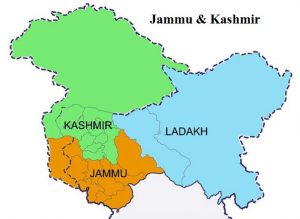Jammu And Kashmir (J&K) Completing Two Years As Union Territory:

The Forum for Human Rights in J&K (FHRJK) released its report a day ahead of Jammu and Kashmir (J&K) completing two years as Union Territory.
- The report raised concerns about the militancy that continues to remain a major challenge in J&K.
- FHRJK is an independent body co-chaired by former Supreme Court judge Justice Madan B. Lokur and former Kashmir interlocutor Radha Kumar.
- On 5 August 2019, the government of India revoked the special constitutional status of the erstwhile state of Jammu and Kashmir under Article 370 of the Constitution, and abrogated Article 35A.
- Article 35A had allowed J&K to define who its ‘permanent residents’ are and what rights and privileges are attached to such residency.
- The former state was bifurcated into the Union Territories of Ladakh (without a legislature) and Jammu-Kashmir (with a legislature).
Concurrently, the Indian government imposed a near-total telecommunications lockdown in the region, detained political leaders and dissidents, and enforced Section 144 of the Indian Penal Code to prevent violent unrest.
Findings from the Report:
- The reports raised concerns regarding human rights abuses, arbitrary detentions, prohibition on assembly and censorship on local media houses in J&K.
- The government has taken several positive steps, but they fell short of expectations.
- It also held that the counter-insurgency concerns continue to be given priority over public, civilian and human security.




